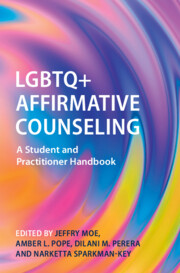Book contents
- LGBTQ+ Affirmative Counseling
- LGBTQ+ Affirmative Counseling
- Copyright page
- Contents
- Figure
- Tables
- Box
- Contributors
- Part I Foundations of LGBTQ+ Affirmative Counseling
- 1 LGBTQ+ Affirmative Counseling
- 2 Intersectionality and LGBTQ+ Populations
- 3 Minority Stress and LGBTQ+ Mental Health
- 4 Advocacy, Society, and Policy Development for LGBTQ+ Affirmation
- Part II LGBTQ+ Lifespan Development and Family Dynamics
- Part III Assessment and Treatment in LGBTQ+ Affirmative Counseling
- Part IV New Directions in LGBTQ+ Affirmative Counseling
- Index
- References
3 - Minority Stress and LGBTQ+ Mental Health
from Part I - Foundations of LGBTQ+ Affirmative Counseling
Published online by Cambridge University Press: 31 October 2024
- LGBTQ+ Affirmative Counseling
- LGBTQ+ Affirmative Counseling
- Copyright page
- Contents
- Figure
- Tables
- Box
- Contributors
- Part I Foundations of LGBTQ+ Affirmative Counseling
- 1 LGBTQ+ Affirmative Counseling
- 2 Intersectionality and LGBTQ+ Populations
- 3 Minority Stress and LGBTQ+ Mental Health
- 4 Advocacy, Society, and Policy Development for LGBTQ+ Affirmation
- Part II LGBTQ+ Lifespan Development and Family Dynamics
- Part III Assessment and Treatment in LGBTQ+ Affirmative Counseling
- Part IV New Directions in LGBTQ+ Affirmative Counseling
- Index
- References
Summary
The minority stress model, based on the theory of minority stress, serves as a primary framework to understand mental health disparities among LGBTQ+ individuals. In this chapter, we describe the model and its relationship with the social determinants of health and multiple minority stress. Interventions and evidence-based practices incorporating this model and barriers to care are discussed.
Keywords
- Type
- Chapter
- Information
- LGBTQ+ Affirmative CounselingA Student and Practitioner Handbook, pp. 37 - 54Publisher: Cambridge University PressPrint publication year: 2024

